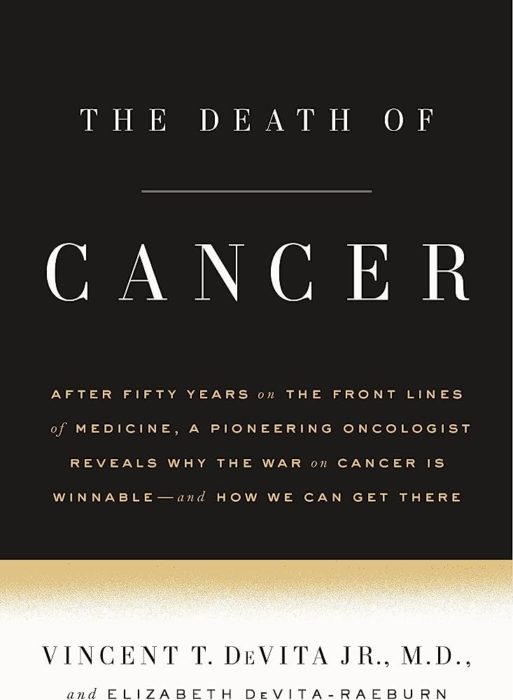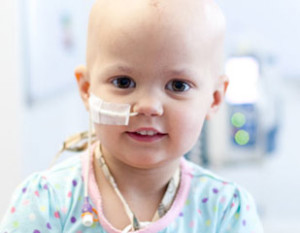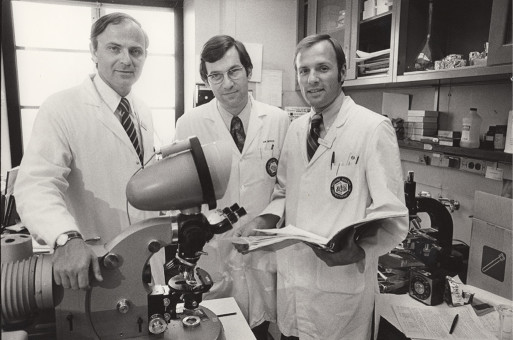 “The Death of Cancer” is a gripping account of the ongoing battle against what is perhaps the world’s most feared disease. Told from the perspective of a physician who has spent most of his adult life searching for a cure, the book is at once hopeful and distressing — an unflinching and oftentimes disturbing discussion of how science, medicine and politics intersect to shape public policy and public health.
“The Death of Cancer” is a gripping account of the ongoing battle against what is perhaps the world’s most feared disease. Told from the perspective of a physician who has spent most of his adult life searching for a cure, the book is at once hopeful and distressing — an unflinching and oftentimes disturbing discussion of how science, medicine and politics intersect to shape public policy and public health.
Vincent DeVita, Jr. M.D., is a clinical oncologist who began his career at a time when a diagnosis of cancer meant certain death. Currently a professor of medicine, epidemiology and public health at the Yale School of Medicine, he began his 50-year search for a cancer cure almost by accident, when he joined a team of doctors at the National Cancer Institute who were using a then-radical approach to treating cancer — combination chemotherapy. A budding cardiologist, he had applied to join the staff at the National Heart Institute, but after “botching” his interview there, he made what he describes as a reluctant choice to join the NCI.
Far from being lauded as trailblazers, the so-called “chemotherapists” who developed the drugs and the drug protocols that are now extending millions of people’s lives were viewed as “butchers” who were quite literally torturing dying patients with toxic drugs.
As a pediatric oncology nurse, I was fascinated by DeVita’s descriptions of the early days of cancer research and the almost super-human efforts of those young pioneers. Far from being lauded as trailblazers, the so-called “chemotherapists” who developed the drugs and the drug protocols that are now extending millions of people’s lives were viewed as “butchers” who were quite literally torturing dying patients with toxic drugs. Even when DeVita and his colleagues began curing young patients with leukemia using combination chemotherapy, their work was rejected by the medical establishment. Only after they developed a proven cure for the once universally fatal cancer known as Hodgkin’s disease did their work gain any acceptance at all.

Today, childhood leukemia is an almost entirely curable disease
(Credit: knolhub.com)
“The Death of Cancer” is a deeply personal and often moving account of DeVita’s struggles and frustrations, including his own battle with prostate cancer and the death of his son, Ted, from aplastic anemia at the age of 17. Yet, to be perfectly honest, DeVita’s all-consuming “death is the enemy” philosophy did not always resonate with me. As someone who has seen the way that many cancer therapies ravage the body first hand, I do not believe that preserving life should be medicine’s only end. What’s more, I found DeVita’s brief account of his son’s eight years of isolation in a sterile hospital room, kept alive by transfusions and medications while his family hoped for a cure, utterly horrifying.
Nonetheless, I came away from the book with a deep respect for DeVita’s courage and conviction and his overarching commitment to his vision of “the greater good.”

Vincent DeVita (center) and colleagues; 1971
(Credit: cancerletter.com)
Although “The Death of Cancer” is an interesting read for professionals, it’s written for laypeople, in simple to understand terms. It catalogs some of America’s most notable achievements in the area of cancer care, but also points out our shortcomings in vivid detail. DeVita’s sweeping indictment of the FDA approval process and the politics at its root may be particularly disturbing for millions of Americans who are living with a cancer diagnosis, or those who have lost someone to the disease. While I do not always agree with DeVita’s point of view, he presents some incontrovertible facts about the bureaucratic and political machinations that go on behind the scenes.
In the end, “The Death of Cancer” is a hopeful book — one that describes an ongoing battle that, according to Dr. DeVita, we can win. “I believe we will see the end of cancer as a major public health issue,” he says in the book’s introduction. “We do face obstacles, but most of them are not scientific. Rather, they are in the form of not using what we know… and the reluctance to drop outdated beliefs, bureaucratic battles…and a Food and Drug Administration that has not caught up with the innovations” in cancer care.
I certainly hope he’s right.

 “The Death of Cancer” by Vincent T. DeVita Jr., M.D. and Elizabeth DeVita Raeburn
“The Death of Cancer” by Vincent T. DeVita Jr., M.D. and Elizabeth DeVita Raeburn


 Having an Estate Plan Is Essential – So Is Discussing It With Your Children
Having an Estate Plan Is Essential – So Is Discussing It With Your Children
 The Healing Sound of Singing Bowls
The Healing Sound of Singing Bowls
 “Summons” by Aurora Levins Morales
“Summons” by Aurora Levins Morales














